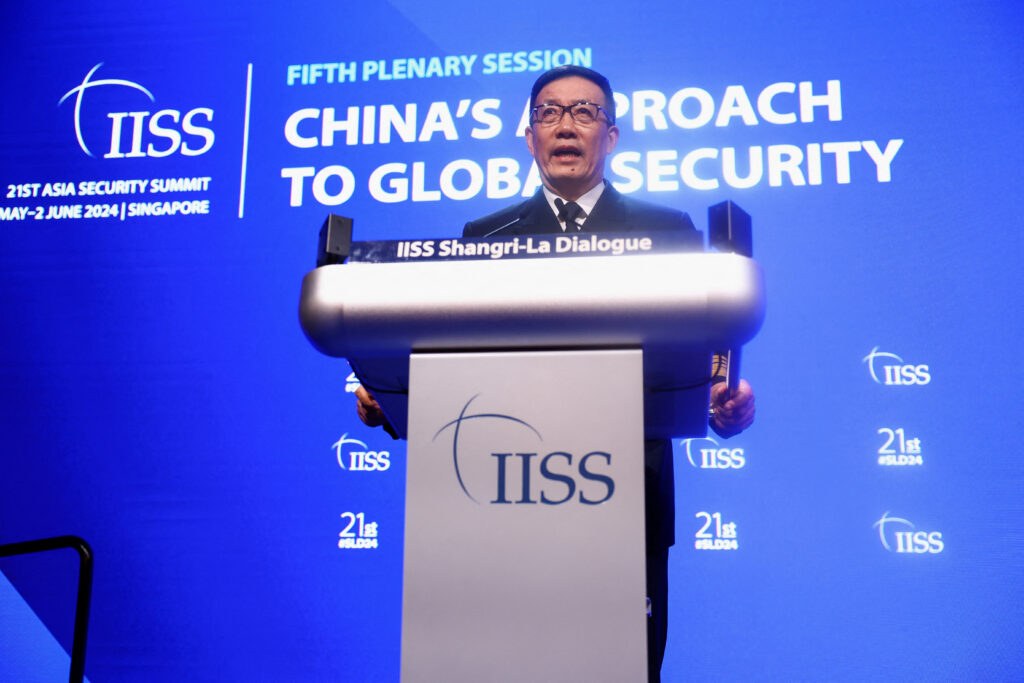The Shangri-La Dialogue in Singapore has so quickly established itself as the World Cup of one-and-a-half track diplomacy that it’s easy to forget that it started only in 2002.
The Dialogue makes headlines for many reasons, including this year via the surprise appearance of Ukrainian President Volodymyr Zelenskyy in Singapore to drum up support for his efforts to capture the peace initiative in the war against Russia. His efforts yielded no signs of policy change on the part of key countries like Indonesia, whose president-elect Prabowo Subianto dodged the question of whether Jakarta would send representatives to a peace summit in Switzerland.
A unique feature of Shangri-La is that it’s one of the only forums in which China’s defence leadership speak publicly about their country’s foreign policy. This year China’s Defence Minister, the PLA Navy Admiral Dong Jun, took a take-no-prisoners approach in a speech that was characteristic of recent Chinese interventions at the Dialogue — that is, more tailored to impress the political leadership at home than to reassure neighbours of China’s commitment to doing its part to lessen the risks of conflict.
US Secretary of Defense Lloyd Austin’s address likewise embodied the contradictions of Biden-era foreign policy — saying all the right things about the value of institutions and rules, but with its credibility undermined by the US failure to practise what it preaches when it comes to fundamental elements of the liberal order, from multilateral trade rules to international humanitarian law.
Austin highlighted what he called the new partnerships among the members of the US hub-and-spoke alliance model, which he lauded as a ‘convergence’ among like-minded states in service of shoring up a rules-based order (something promptly denounced as a proto-Asian NATO by the Chinese delegation).
One of those ‘spokes’ that is joining up strategically with the others is the Philippines, whose president is in favour in Western capitals as he pushes back against China’s efforts to enforce its maritime claims in the South China Sea.
But the Philippines approach is far from representative of the Southeast Asian norm. Cheng Chwee Kuik argues in this week’s lead article that it’s ‘wishful thinking’ to think of Marcos’ Philippines as ‘a bellwether for Southeast Asia, in particular claimant and littoral states of the South China Sea disputes’. He says, ‘the conditions pushing the Philippines to return to the old alliance-first approach are not shared by other ASEAN states’, who ‘do not consider China — at least not yet — a black-and-white threat, while the United States is not that straightforward a patron’.
Kuik uses this juxtaposition of the Philippines with its ASEAN neighbours to unpack the deep logic of hedging, the ubiquitous but frequently under-theorised label used to describe Southeast Asian states’ behaviour in response to great power competition. As he writes, a hedging strategy ‘is more desirable’ from the perspective of these smaller powers ‘because it allows [them] to maximise other goals like prosperity and autonomy while still keeping their security options open’.
Almost as if to validate this point, Indonesia’s defence minister and now president-elect Prabowo Subianto told the Shangri-La Dialogue that Indonesia would continue to seek partnership with both the United States and China in its national interest. Malaysian Prime Minister Anwar Ibrahim, speaking late last week at a forum in Kuala Lumpur, was perhaps politely venting some exasperation with his Philippine counterparts when he mentioned that although he ‘understand[s] the concerns expressed by [President] Marcos’ about China’s behaviour in the Philippine EEZ, ultimately ‘[t]here should not be involvement with other parties’ — without a doubt an allusion to the United States — ‘because it will be deemed to be more complex and will complicate the matter’.
Anwar, who leads the government that will chair ASEAN in 2025, knows full well that Manila is leaning into its alliance relationship in large part because from its perspective, ASEAN processes have not begun to deliver resolution to the legal dispute about sovereignty that underlies its crisis-ridden relationship with China. At the same forum last week, Anwar promised a new ‘aggressive’ diplomatic engagement on the South China Sea.
As the prime minister surely understands, if the transformation of intra-regional disputes over issues like the South China Sea are not to become destabilising proxy struggles between the great powers, then the onus is now on ASEAN and its members to upgrade the home-grown institutions of East Asian political and security cooperation to address these challenges through diplomatic means.
The EAF Editorial Board is located in the Crawford School of Public Policy, College of Asia and the Pacific, The Australian National University.


Leave a Reply